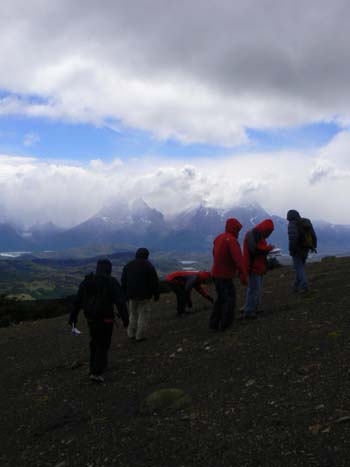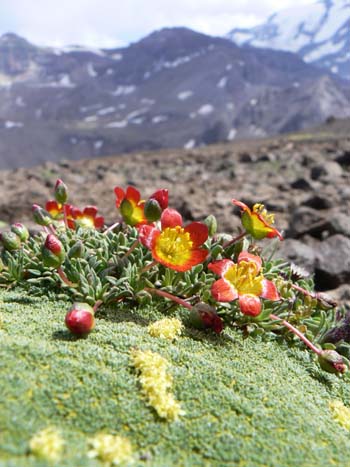Cushions and Condors – a quick trip to Patagonia
Rob Brooker, Plant Ecologist
Edited highlights from an article to appear in the Summer 09 edition of In-Land Magazine.
 At the end of 2008 I was headed for Patagonia, the southernmost portion of South America…. …Darwin probably went to Patagonia because he had to – the Magellan Straits were the main shipping route around South America at a time before the Panama Canal, and any global circumnavigation by the Beagle had no choice but to head south and around the southern tip of South America.
At the end of 2008 I was headed for Patagonia, the southernmost portion of South America…. …Darwin probably went to Patagonia because he had to – the Magellan Straits were the main shipping route around South America at a time before the Panama Canal, and any global circumnavigation by the Beagle had no choice but to head south and around the southern tip of South America.
Following helping to teach on a plant ecology course for South American students, the second reason for my journey was some fieldwork. This was a contribution toward a global study of the biodiversity impacts of cushion plants. Their tough, dense foliage and low ground-hugging profile enable them to buffer the effects of the harsh environmental conditions found in the relatively arid systems of the Andes. They also provide favourable microsites for the establishment and growth of many other plant species, and are central to regulating biodiversity in these harsh environments.
The beneficial effects – also known as facilitative effects - of plants such as these cushions have received increasing interest in ecology over the last 10-15 years, and are somewhat at odds with classic evolutionary or ecological theory. Darwin’s original theory focussed very much on the survival of the fittest: organisms fight for resources and those best “fitted” to their environment get the resources, successfully reproduce, and pass on their genes to the next generation. More recently, the important role of beneficial interactions, particularly in extreme environments such as the polar, alpine or desert systems, has been increasingly recognised.
 Visiting new environments such as Patagonia challenges my preconceptions – breaking me out of a world-view moulded by our relatively productive temperate UK climate – and allows me to get a feel for the key processes regulating the evolution and ecology of plant species in different environments around the world. And, to immodestly put myself in the company of the greats for a moment, I suspect this was also the case for Darwin. His travels on the Beagle gave him the opportunity to contrast and compare a huge variety of systems, to spot the differences between species and yet at the same time the overriding importance of common processes such as evolution which shaped their form and habit.
Visiting new environments such as Patagonia challenges my preconceptions – breaking me out of a world-view moulded by our relatively productive temperate UK climate – and allows me to get a feel for the key processes regulating the evolution and ecology of plant species in different environments around the world. And, to immodestly put myself in the company of the greats for a moment, I suspect this was also the case for Darwin. His travels on the Beagle gave him the opportunity to contrast and compare a huge variety of systems, to spot the differences between species and yet at the same time the overriding importance of common processes such as evolution which shaped their form and habit.
So, the next time that you see an ecologist sneaking off on an international research trip, it might be another Darwin in the making. And yes, I did see some condors…
|
Updated: 23 Jan 2024, Content by: CN
|



